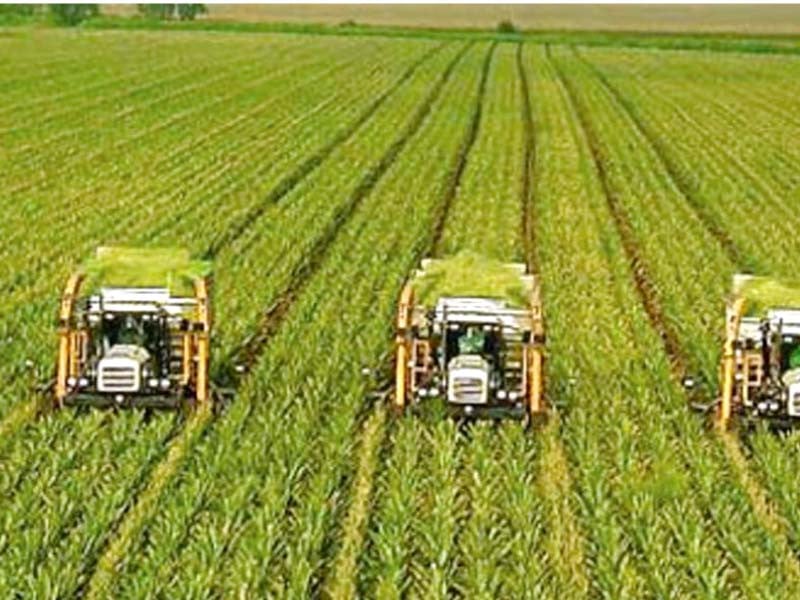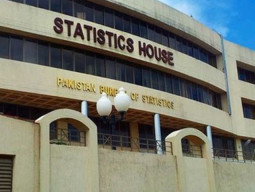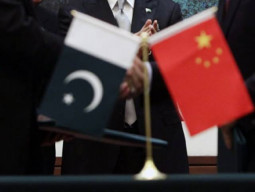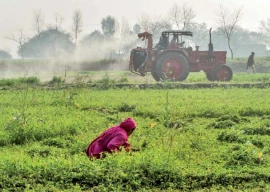
China’s agricultural modernisation has been remarkable, ensuring food security for its billion-plus population. Pakistan can leverage Chinese expertise to revitalise its agricultural sector, a cornerstone of its economy.
In Pakistan-China collaboration, both countries benefit from diverse environmental conditions conducive to crop cultivation and livestock rearing.
“Effective management of postharvest losses and enhancing the value of fruits and vegetables through research and development (R&D) collaboration with China is crucial. With Pakistan producing 20 types of fruits and 40 types of vegetables, the high postharvest losses of about 40% in the supply chain result in significant waste, limiting consumer access,” said Prof Dr Zahir Ahmed Zahir, from the University of Agriculture Faisalabad’s Institute of Soil and Environmental Sciences, also serving as President of the Soil Science Society of Pakistan (SSSP).
“Currently, Pakistan’s export of fruits and vegetables stands at $600 million, a figure that could potentially reach $2 billion by improving postharvest practices, reducing losses, and fostering value-added products and industries,” he said.
China’s staple food is rice, while Pakistan relies heavily on wheat. China made rice yield scaling a priority. In 1964, Chinese Scientist Dr Yuan Longping, recognised as the father of hybrid rice, dedicated himself to this task, achieving success in 1972 with the development of a high-yield hybrid rice variety, increasing yield by 20%.
Presently, China boasts hundreds of hybrid varieties, effectively meeting local demand and bolstering food security.
“We are harnessing China’s hybrid varieties as well. In Sindh, we cultivate rice on two million acres, with half of this land dedicated to hybrid varieties imported from China,” said Dr Nihaluddin Marri, Agriculture Research Sindh Director Technical-I.
“To ensure food security, we must focus on three key areas: enhancing high-yield hybrid wheat, optimising storage systems, and managing population growth to halt the conversion of agricultural land into housing schemes. With a rising population and diminishing agricultural land due to expanding housing societies across the country, these measures are imperative,” he added.
Professor Zhou Chang Ming from Xinjiang Agriculture University in China highlighted the current robust state of China’s agricultural production. As the world’s leading producer of wheat, rice, and corn, China also cultivates significant quantities of soybean, cotton, sugar, and other agricultural products. This abundance not only sustains domestic needs but also fuels international markets.
The agricultural landscape in China is evolving, transitioning from a focus solely on food cultivation to a diversified portfolio including vegetables, fruits, livestock, and poultry farming. This diversification enhances resilience within the agricultural sector, mitigating risks associated with reliance on a single industry.
Read: Alvi calls for agricultural tech to combat climate change
“China’s 14th Five-Year Plan for Agricultural and Rural Modernisation aims to advance rural farming practices, thereby boosting the income growth of rural residents. With significant investments in agricultural research, development, innovation, and mechanisation, China has significantly enhanced the quality and profitability of its agriculture sector. Serving as a model for other developing nations, China’s agricultural modernisation efforts offer invaluable lessons. Notably, the China Maps centres by Syngenta exemplify innovation in the sector, providing comprehensive solutions for farming needs and leading to unprecedented yield improvements,” highlighted Zeeshan Baig, General Manager of Syngenta Pakistan, an esteemed figure in agricultural technology.
Pakistan stands to gain significantly from China’s agricultural modernisation on multiple fronts. Firstly, by enhancing cooperation with China through the China-Pakistan Economic Corridor (CPEC), Pakistan can access opportunities for infrastructure development, trade facilitation, and technology transfer within the agricultural sector.
Secondly, drawing insights from China’s successful agricultural policies, planning, and management practices can aid Pakistan in overhauling its agricultural productivity, efficiency, and sustainability.
Thirdly, by tapping into China’s vast market potential and demand for agricultural products, particularly high-value and niche items like fruits and vegetables, Pakistan can bolster its export revenue.
Lastly, Pakistan can leverage China’s support and assistance to address various challenges confronting its agriculture sector, including climate change, water scarcity, pests and diseases, and food safety concerns.
Utilising state-of-the-art machinery and cutting-edge components can produce high-quality seeds and breeds developed through biotechnology, genetic engineering, and hybridisation. These advancements result in crops with higher yields, increased resistance, and enhanced adaptability. Embracing digital agriculture, including satellite imaging and Internet of Things (IoT) sensors, offers valuable data for improved decision-making, pest management, and soil and water crop management.
Additionally, prioritising research and development in biotechnology can lead to the creation of high-yielding and climate-resilient crop varieties tailored to Pakistan’s unique agro-climatic conditions. Smart and precision agriculture utilise big data, Artificial Intelligence (AI), IoT, drones, sensors, and satellites to monitor and optimise agricultural production and management.
Meanwhile, modern agricultural machinery and equipment, such as tractors, harvesters, planters, sprayers, irrigation systems, and storage facilities, enhance the mechanisation and automation of agricultural operations.
“China has placed a significant emphasis on value addition, concurrently reducing losses to a mere 2%, by enhancing the production, packing, and marketing of value-added products domestically and internationally. It is imperative for us to adopt and adapt to Chinese technologies in this regard. Currently, we suffer from substantial losses, particularly in horticulture, with approximately 40% of food and vegetables going to waste. Moreover, China’s proactive promotion of sustainable agriculture practices, including organic farming and conservation efforts, underscores its commitment to addressing environmental concerns and ensuring long-term sustainability. The journey of China’s agricultural modernisation exemplifies its dedication to transforming its agrarian economy into a technologically advanced and sustainable sector capable of navigating future challenges,” remarked Prof Dr Muhammad Ismail Kumbhar, a renowned Researcher and Sustainable Development Expert from the Department of Agricultural Education Extension at Sindh Agriculture University (SAU).
Key areas to address to reduce postharvest losses and enhance value addition in fruits and vegetables include:
1. Capacity building in postharvest technology and value addition through collaboration with Chinese experts.
2. Introduction and technology transfer of modern tools, equipment, and machinery for harvest, postharvest management, and packaging of fruits and vegetables.
3. Development of value-added products and processing technology for fruits and vegetables.
4. Exchange of promising cultivars of fruits and vegetable crops to improve yield and quality.
5. Automation of nursery technology for horticultural crops through collaboration with Chinese R&D counterparts.
6. Implementation of quality seed production and processing technology, especially for hybrid seeds.
7. Establishment of food processing zones near CPEC to enhance value-added products, thus stimulating economic growth through agricultural export-led strategies.
China’s expertise can play a crucial role in capacitating Pakistani experts and attracting investors to these processing zones, fostering collaboration and innovation in the agricultural sector.
The writer is a staff correspondent
Published in The Express Tribune, March 4th, 2024.
Like Business on Facebook, follow @TribuneBiz on Twitter to stay informed and join in the conversation.


1732271743-0/diddy-(45)1732271743-0-165x106.webp)


















COMMENTS
Comments are moderated and generally will be posted if they are on-topic and not abusive.
For more information, please see our Comments FAQ